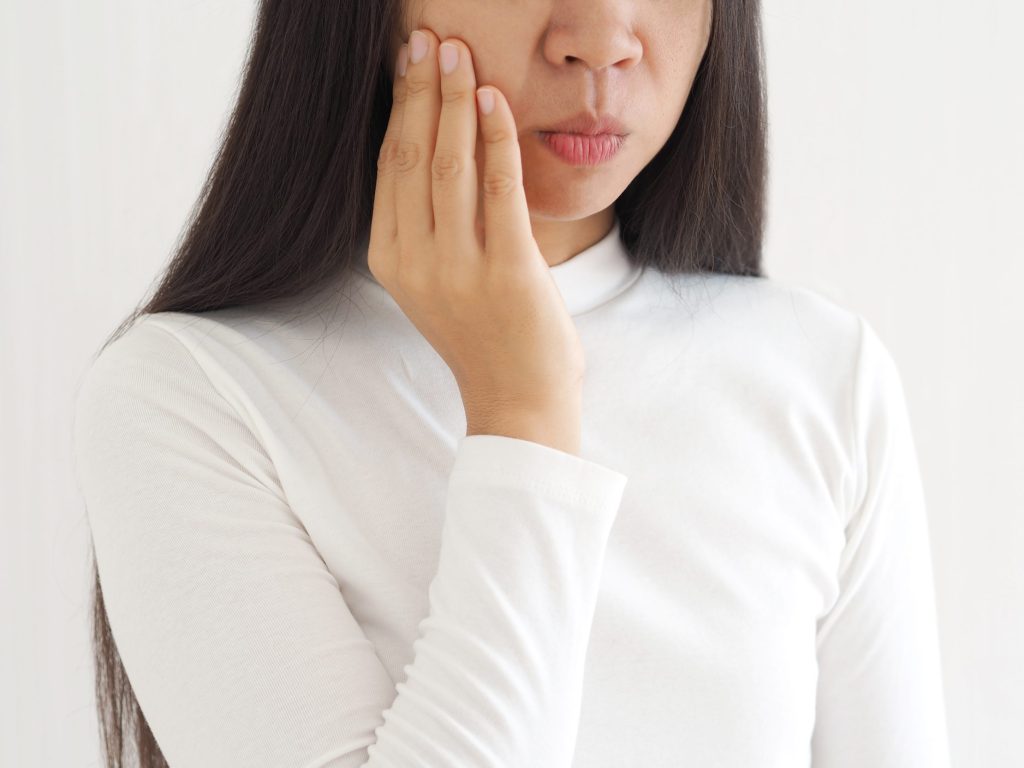An estimated 5-12% of individuals suffer from TMD. Although it is not an incredibly common ailment, it can cause a significant amount of pain and discomfort for those who suffer from it. As a result, these individuals can experience symptoms that lower their quality of life if they are not diagnosed and treated. For most individuals suffering from TMD, reporting the signs and symptoms of the disorder to a doctor or dentist is what eventually leads them to receive a diagnosis.
What Is TMD?
The temporomandibular joints (TMJs) are the jaw joints that act as sliding hinges, allowing the jaw to function properly and move in all different directions. The term “temporomandibular joint disorder” (also commonly referred to simply as TMD or TMJD) refers to several different conditions that affect the TMJs and the ligaments, muscles, and tissues that surround them.
TMD can present itself with a long list of potential symptoms. Some of which are more commonly known than others.
10 Lesser Known Signs and Symptoms of TMD
1. Neck, Shoulder, and Back Pain
Although TMD is widely known for causing jaw pain, it can also result in pain, stiffness, soreness, or tenderness in the neck, shoulders, and back.
2. Earaches
TMD can also result in earaches or general ear pain. If you have an earache without signs of an infection, you could be suffering from TMD.
3. Pinched Nerves
TMD can result in pinched nerves that occur due to muscle tension and vertebral subluxations. This can cause radiating pain or sensations of tingling and numbness in several places including the face, neck, shoulders, back, arms, and legs.
4. Sleep Apnea
Sleep apnea and TMD are often associated with each other. Individuals who are diagnosed with TMD commonly suffer from sleep apnea due to a misaligned jaw causing the blocking of a person’s airways during sleep.
5. Sinus Pressure or Pain
TMD can result in inflammation in the jaw joints and also general inflammation around all of the maxillofacial structures. As a result, individuals with TMD can experience sinus pain and pressure that can feel similar to a sinus infection.
6. Eye Pain
TMD inflammation and sinus pain or pressure can also result in eye pain or a feeling of pressure behind the eyes.
7. Dizziness or Vertigo
The inflammation that occurs in the sinuses and around the ears can affect a person’s equilibrium, resulting in dizziness or feelings of vertigo.
8. Tinnitus
Another lesser-known symptom of TMD is tinnitus or persistent ringing in the ears.
9. Bite Changes
TMD can wear down the teeth, result in changes in teeth alignment, and even change the size or shape of the jawbone. As a result, TMD can cause a person’s bite to change and feel different over time.
10. Facial Fatigue
Since TMD tends to wear out the muscles that control the jaw joints, it can result in feelings of facial fatigue, numbness, or tiredness.
What Are the More Common Signs and Symptoms of TMD?
The above-listed symptoms could be an indication of a temporomandibular joint disorder. However, they are the less common or lesser known signs and symptoms. The following signs and symptoms include those that people are more familiar with and that patients with TMD experience most often:
- Jaw pain
- Popping or clicking sounds in the temporomandibular joints
- Grinding sensations in the temporomandibular joints
- Tooth sensitivity
- Bruxism
- Worn enamel
- Headaches
- Lockjaw
If you experience any of these symptoms, those listed above, or other kinds of maxillofacial pain, we encourage you to schedule an examination with a dental professional.
What Causes TMD?
Several underlying conditions can cause TMD. For many patients, more than one factor contributes to their TMD symptoms. Causes of TMD include:
- Malocclusion (overbite, underbite, crossbite, or open bite)
- Crooked teeth
- Misaligned jawbones
- Condylar resorption
- Excessive strain on the temporomandibular joints
- Wear and tear
- Bruxism
- Trauma or injury to the face, temporomandibular joints, jawbone, or neck
- Dislocation of a temporomandibular joint
- Arthritis
- Stress
- Genetics
TMD Diagnosis and Treatment
When a patient complains of TMD symptoms to their doctor or dentist, the next step is to determine what is causing the symptoms and the type of temporomandibular joint disorder present in the patient. Diagnosis typically involves a consultation, examination, diagnostic images, and evaluation.
Once the underlying cause (or causes) has been determined, appropriate treatment can be recommended. Most treatments are aimed at correcting the underlying cause of the disorder and/or alleviating the patient’s symptoms. TMD treatments include:
- Lifestyle adjustments and dietary changes (not chewing gum and avoiding particularly chewy foods)
- Resting the temporomandibular joints
- Over-the-counter or prescription pain relievers
- Stress management
- Relaxation and meditation techniques
- Mouth splint (nightguard)
- Orthodontics (such as braces to correct jaw alignment or crooked teeth)
- Physical therapy
- Posture training
- Heat therapy
- Ice packs
- Surgery
Patients are often recommended a multifaceted approach to treatment that includes a selection of treatments and therapies.
TMD Treatment With Our Board-Certified Prosthodontist in Loveland
If you have symptoms and suspect you might be suffering from TMD, we strongly encourage you to schedule a consultation with our prosthodontist in Loveland. Dr. Andrew Bock can talk with you about your symptoms, evaluate your jaw and occlusion (bite alignment), and also take a variety of diagnostic images to verify a TMD diagnosis and determine the most appropriate treatment plan for addressing the underlying cause of your TMD. We can offer our patients a variety of treatment approaches for correcting the causes of TMD and alleviating symptoms including nightguards and orthodontics.
To learn more about TMD or to schedule an appointment with Dr. Bock, we welcome you to contact Northern Colorado Implant and Prosthetic Dentistry in Loveland today.






